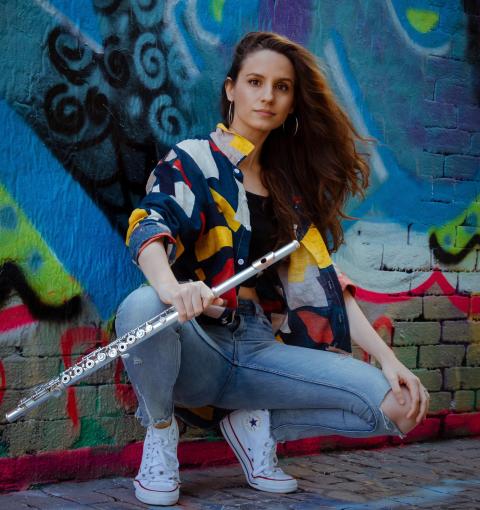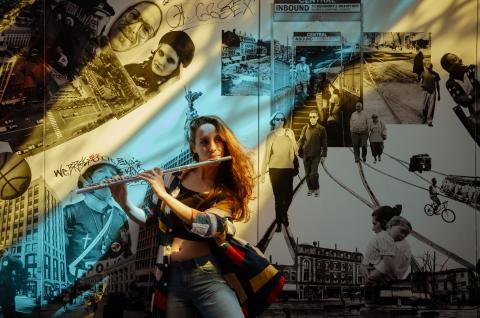Flutist Sheila del Bosque Plays Through the Prism of Cuban Culture

Sheila del Bosque B.M. ’22
Image courtesy of the artist
Flutist, composer, and conductor Sheila del Bosque B.M. ’22 has been a member of the renowned Havana Lyceum Orchestra and National Orchestra of Cuba, played alongside such luminaries as Paquito D’Rivera, Omar Hakim, and Danilo Pérez, and recently added another achievement to her résumé when she won first place in the National Flute Association’s Jazz Artist Competition.
A native of Havana, Cuba, del Bosque began her classical flute studies at the age of 10. She excelled rapidly in a demanding musical environment and later earned a full scholarship to Berklee, where she majored in performance and film and media scoring. Her talents have brought her to major theaters and festivals in Cuba, as well as high-profile venues in South Korea, Mexico, Germany, and the United States.
You might have seen del Bosque playing with her own trio or caught one of her Berklee Anywhere or Two Track performances. Maybe you were lucky enough to see her represent Berklee at the Next Generation Jazz Festival in Monterey, California. This Saturday, she'll participate in QUEENS: A New Generation of Women Composers, a concert focused on living women composers worldwide. In this interview we were fortunate to speak with del Bosque about what it takes to compete at the highest level and how her background has helped her and her music stand out.
First off, congratulations on winning first place at the National Flute Association (NFA) competition. How does preparing for a musical competition compare to preparing for a concert?
The NFA was my first big competition, and I enjoyed every minute of the experience! The preparation is different from regular performance. You have [to deal with] a jury, competitors, and expectations to win. These are some things I learned after going through this process:
- Competitions are fantastic because they get you out of your comfort zone and make you grow as a human being and musician. You will learn so much about yourself, your self-esteem, and your relationship with music.
- Know your tunes from all the perspectives you can imagine. Study slowly, with heart and intention. Work on your muscle memory, your visualization, and your ears. Don’t be hard on yourself; you are supposed to sound bad in a practice room.
- Mental preparation is key, and this is true for both concerts and competitions. Running the whole performance mentally, and actually, the whole day, is extremely helpful. Prepare what to eat and what to wear, have a specific schedule for the day, and focus on creating every detail of that day in advance.
- Enjoy the music, the way you feel, and the energy from the audience. And don’t take yourself too seriously.
You’ve played on huge stages all over the world and in front of some very high-profile people. Are there any performances or specific moments that stand out to you as having defined your journey as an artist?
A few come to mind immediately: performing for Bon Jovi, First Lady Jill Biden, Usher, and Pope Francis; the first time I traveled out of Cuba to perform at the South Korea Cuban Cultural Festival, in 2013; performing at the Konzerthaus Berlin with the Cuban European Youth Orchestra; performing my compositions for the first time with my band at the Berklee Performance Center and at the 49th Next Generation Jazz Festival; recording in the studio with one of my mentors, Danilo Pérez; and conducting at the Cincinnati Music Hall as part of the International Conductors Guild events.

Sheila del Bosque
Image courtesy of artist
Can you talk about your relationship with music growing up in Havana, and how the city’s culture helped shape your perspective on music and performing?
I feel extremely blessed and grateful that I grew up in Cuba, such a musical country where the culture is as diverse as its people. When I was 10 years old, I started to study flute in a very demanding system of classical music education. I developed a big passion for European classical music, but even though I grew up listening to everything from Bach to timba, in a very natural way, I’m still on my journey of understanding music as one. I love finding similarities in different styles that have been sadly put apart from each other due to Eurocentrism and the validation of foreign cultures above ours.
As I grew up and played in classical music orchestras, early music ensembles, and Cuban popular music bands, I felt that all of this, although it seemed totally different, was a hallmark of our culture. Understanding that in Cuba there was a late baroque and strong European influence as a colony of Spain, a strong African influence due to the entire process of slavery, and then a strong influence of North American music due to the military occupation. Appreciating each edge of that prism helps you understand the richness of our culture. From a wider perspective, having been born in Cuba gave me a deep sense of community, rhythm, commitment, passion, resilience, a great sense of humor, and an almost naive trust in life.
You participated in a wide variety of unique performance settings at Berklee, such as the Berklee Anywhere concert series and the Two Track video project. What have you learned about yourself as a musician and a performer while studying and taking part in these experiences at Berklee?
I think Berklee has an outstanding balance of preparing you for the standards of the industry while inspiring your creative self. I have been extremely fortunate to participate in different musical adventures, and I take them as a challenge and an opportunity to grow. Some of the things I learned during these projects were the commitment to putting my whole energy and professionalism into every moment, the freedom to be myself and be honest with who I am, and to enjoy all stages of the creative process.
You had the opportunity to perform alongside Cuban saxophonist and Latin music legend Paquito D'Rivera when he visited Berklee. Talk about what it means to you to be able to play with an icon of his stature with whom you share so much in common.
Paquito D’Rivera is an icon for every Cuban musician. He has great charisma, virtuosity, passion, and respect for the Cuban tradition while having the imagination to create new worlds. Sadly, due to the political system in Cuba, we have many artists that don’t come to the island to perform, and Paquito is one of them. For me, since I was little, he represented the myth of someone who I admired deeply that I couldn’t hear live.
I always say that Berklee isn’t just about the school itself but all the possibilities that come with it. The exposure to diversity, new approaches to life, the opportunity to see your culture from another perspective, the infinite paths of creativeness, the networking experience, and the possibility of performing and collaborating with some of your musical heroes. I never thought I would be able to perform at Paquito D’Rivera’s concert at Berklee. It’s one of those moments that you treasure and fill you with pride. It’s always incredible to see Cuban musicians who are recognized on the world scene and to get to share the stage with them is priceless.
Watch Sheila del Bosque's performance on Berklee's Two Track video series:




